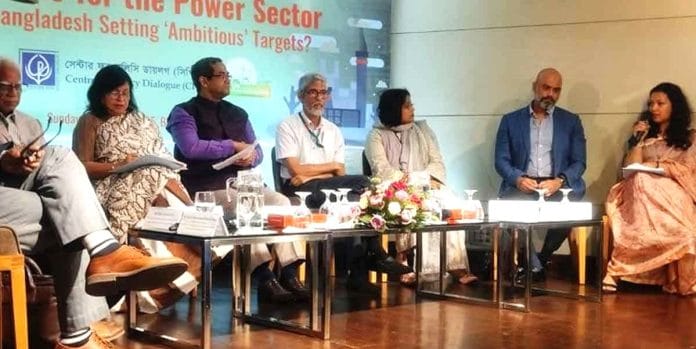Bangladesh will require hefty domestic and overseas investment to achieve the target of generating 30 percent of its electricity from renewable sources by 2040, says a new report of the Centre for Policy Dialogue (CPD).
Given the average plant factor for renewables of 0.25, achieving the 30 percent target would require the country to add 35,713 megawatts (MW) of renewable power capacity alongside continuing fossil fuel-based plants, it says.
The think tank has estimated that in order to reach that goal, Bangladesh will need between $35.2 billion and $42.6 billion in investment from 2025 to 2040 to expand its renewable energy sector.
The report, titled “Revisiting Targets Set for Renewable Energy-based Power Generation by 2040: Projection of ‘SMART’ Target and Required Investment,” was unveiled at a dialogue at the BRAC Centre in Dhaka on Sunday.
It was presented by Mehadi Hasan Shamim, programme associate at CPD, who outlined the country’s renewable energy challenges and the investments required to transition away from fossil fuels.
The dialogue titled “NDC 3.0: Future Targets” was moderated by CPD’s Research Director Dr. Khondaker Golam Moazzem.
Speakers at the event noted that Bangladesh’s power sector is currently the country’s largest source of carbon emissions. In line with the UN Framework Convention on Climate Change (UNFCCC), they stressed the need for more ambitious emissions reduction targets.
The Department of Environment is currently drafting the country’s third Nationally Determined Contribution (NDC 3.0) for 2025. Bangladesh has already committed to generating 20 percent of its electricity from renewables by 2030, with plans to increase this to 30 percent by 2040.
However, CPD noted that meeting these goals will be impossible without major financial support.
CPD’s research indicates that building a sustainable power sector over the next two decades will require massive investments. According to its estimates, generating 16,655 megawatts (MW) of electricity will require $18 billion.
In 2035, an additional 12,832 MW will need $13 billion, while by 2041, 11,124 MW will require $11 billion. The total $32 billion needed could potentially be sourced from around 30 global climate funds.
As of March 2025, renewable energy contributes only 3.6 percent to the national grid, while gas-based power makes up 43.4 percent. The report also highlighted a looming imbalance, noting that fossil fuel-based capacity is set to outpace electricity demand. By 2030, fossil fuel capacity is projected to reach 29,773 MW—more than 4,000 MW above the anticipated demand of 22,702 MW—and is expected to continue exceeding demand through 2040. This surplus capacity could hinder the integration of renewables and reduce system efficiency.
At the event, industry leaders and experts raised several concerns. Professor M Rezwan Khan, chairman of Power Grid Bangladesh PLC, stressed that investor confidence is crucial for promoting renewable energy, but noted that the Bangladesh Power Development Board (BPDB) often defaults on payments to power plant owners, undermining that trust.
Imran Karim, former president of the Bangladesh Independent Power Producers Association (BIPPA), pointed out that renewables currently account for only about 2 percent of actual electricity generation.
He estimated that reaching 20 percent by 2030 would require an investment of $12 to $14 billion and emphasized the need for faster tender processes to encourage private sector participation.
The CPD report called for comprehensive policy action to meet renewable energy goals. It recommended developing a detailed implementation plan based on specific energy sources, including interim targets for 2030 and 2035, and a clearly defined schedule to phase out fossil fuels.
The report stressed the importance of publishing a fossil fuel phase-out plan, upgrading grid infrastructure, and deploying storage technologies to manage the variability of renewable sources.
To bridge immediate gaps in supply and support long-term energy security, CPD urged the government to explore electricity imports from Nepal, Bhutan, and India, and to promote cross-border investment.
It also recommended mobilising concessional financing through engagement with multilateral development banks and international climate funds, while encouraging private capital to cover the over $35 billion needed.
Further investment in decentralised energy systems, such as rooftop solar and mini-grids, was also highlighted as essential. According to the report, real progress can begin by slowing the expansion of fossil fuels and accelerating the deployment of renewables
Two research papers were presented during the session. CPD Programme Associate Mehadi Hasan Shamim shared findings on the progress of implementing NDC 2.0, while Helen Mashiat Preoty presented an analysis of the appropriate energy mix and required investment to meet climate goals by 2040.
The research stressed that failure to harness the potential of renewable energy would significantly hinder efforts to meet adaptation and emission reduction targets.
The CPD study also warned that if renewable targets are not met by 2035, Bangladesh’s power sector could become even more dependent on carbon-intensive energy, posing a serious challenge to its international climate commitments.
Special guests at the discussion included Mohammad Navid Safiullah, Additional Secretary of the Ministry of Environment, Forest and Climate Change, and Dr. Fahmida Khanam, Additional Secretary of the Ministry’s Environment Wing. Also present was Dr. M Asaduzzaman, former Director General of the Bangladesh Institute of Development Studies (BIDS).

